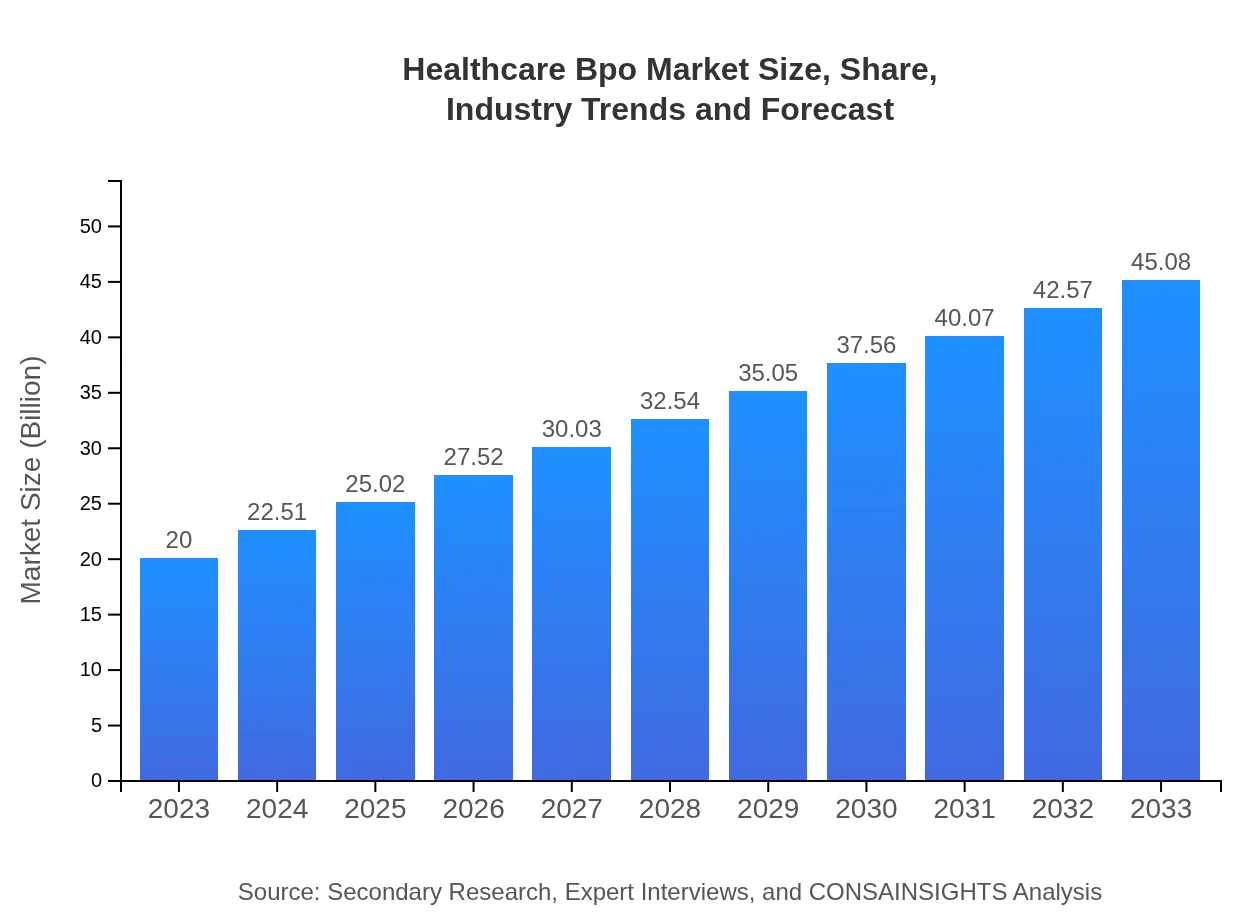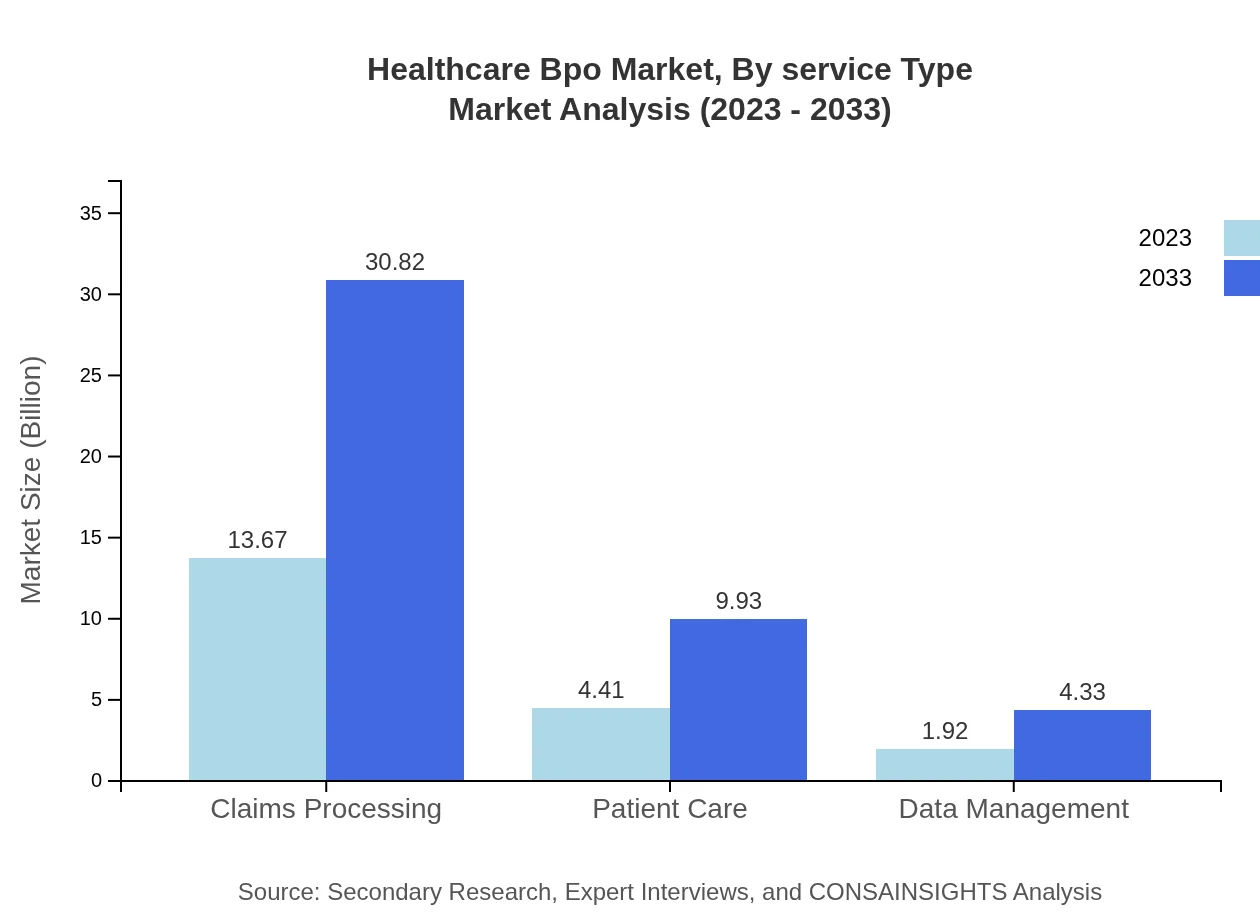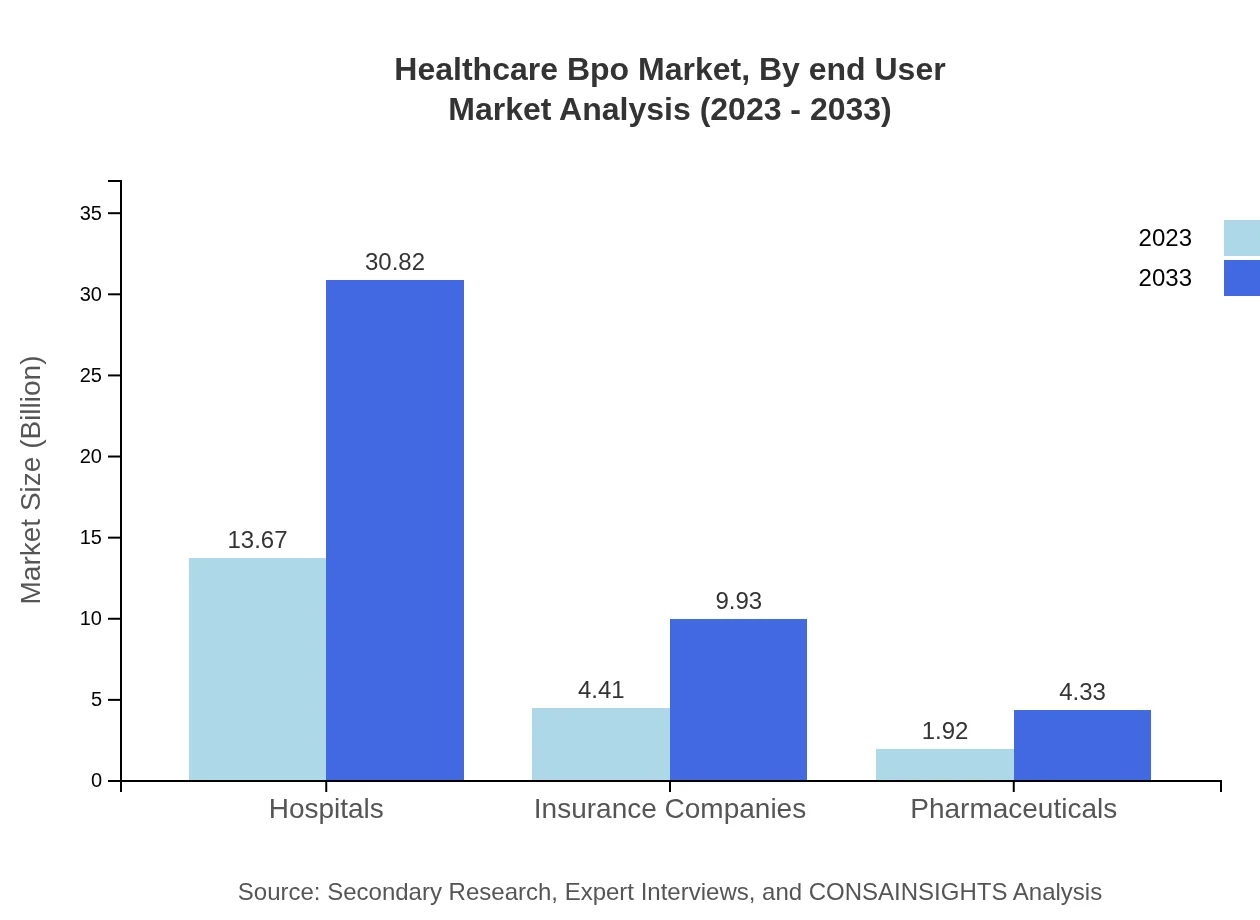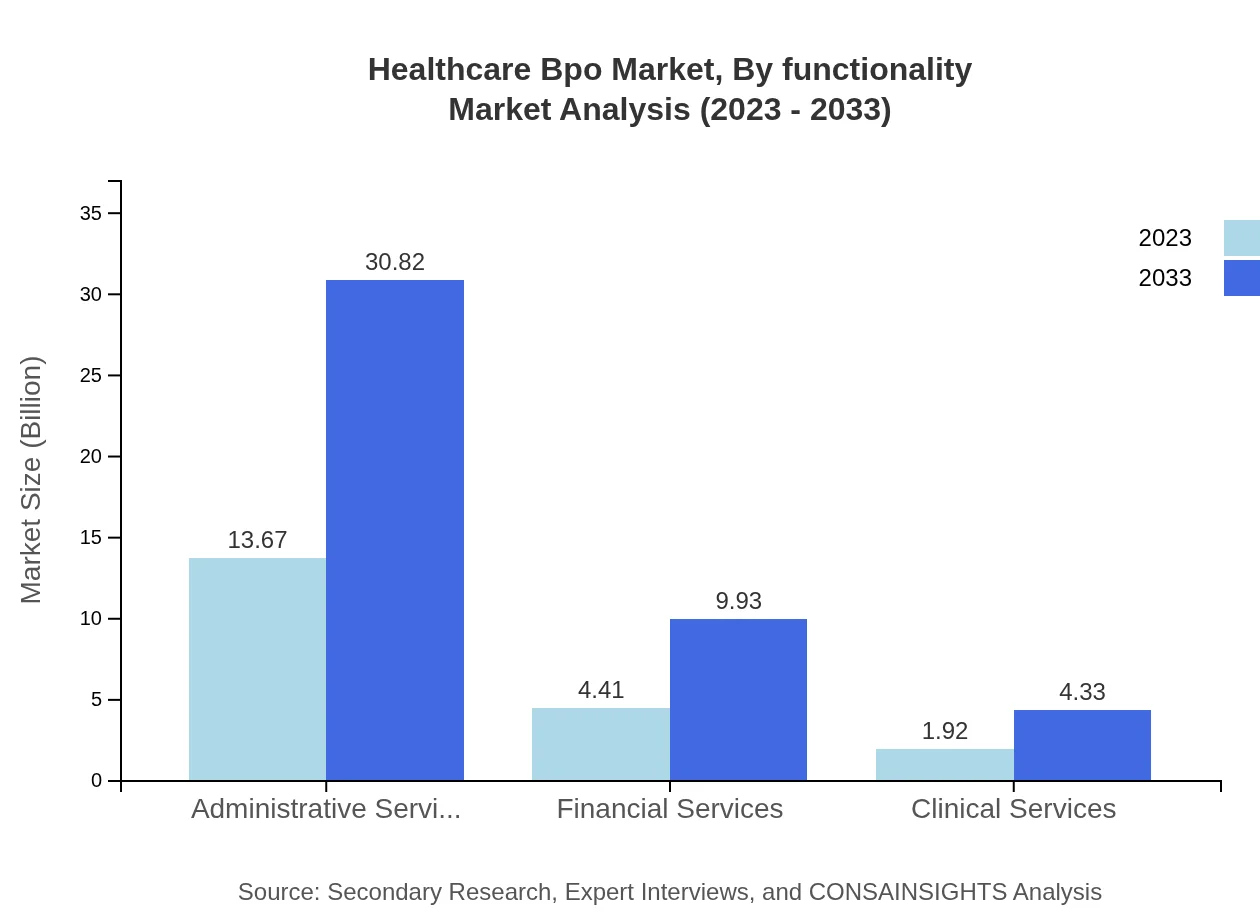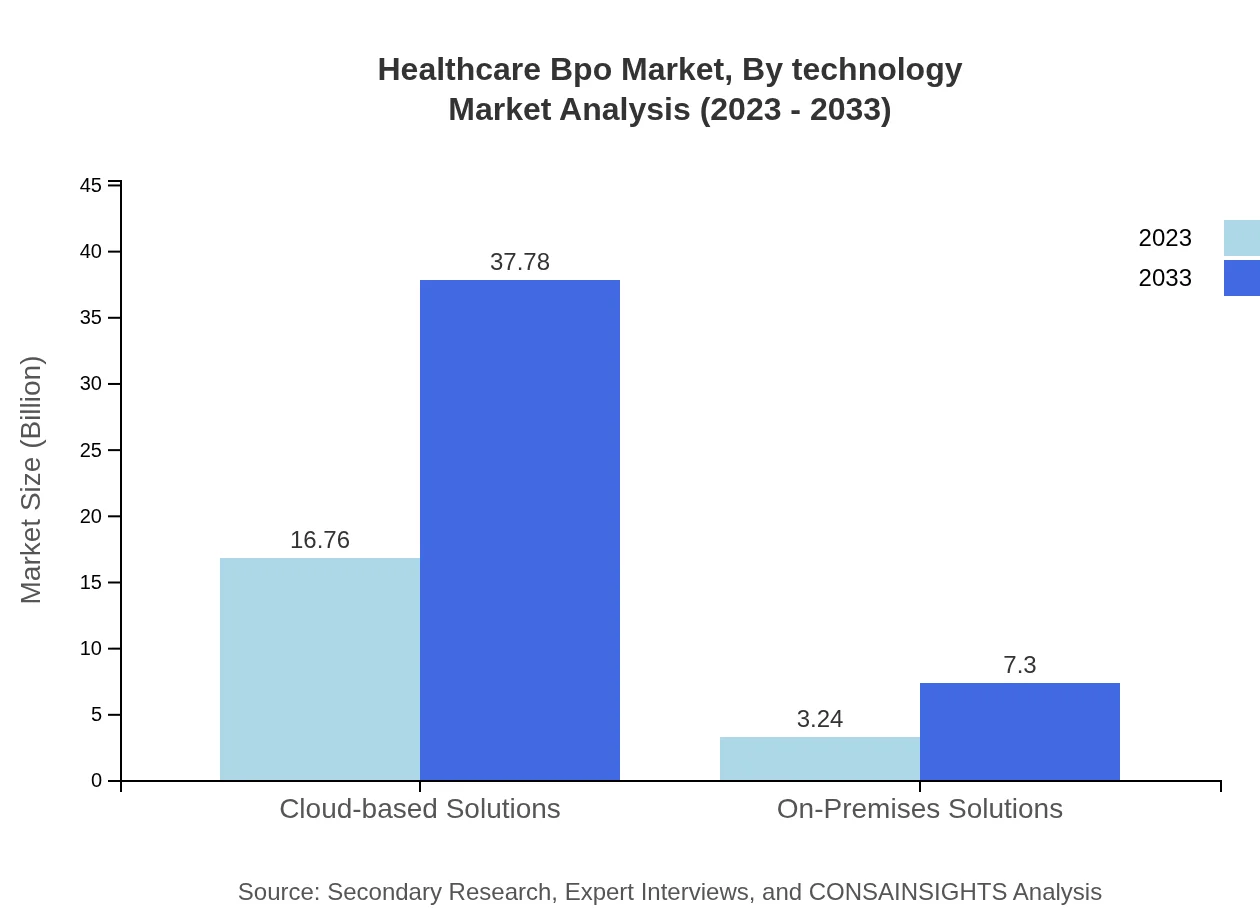Healthcare Bpo Market Report
Published Date: 31 January 2026 | Report Code: healthcare-bpo
Healthcare Bpo Market Size, Share, Industry Trends and Forecast to 2033
This report provides an in-depth analysis of the Healthcare BPO market, highlighting key trends, growth opportunities, and forecasts for 2023 to 2033. It includes market sizing, segmentation, regional insights, and the competitive landscape, aimed at offering valuable insights to stakeholders in the healthcare industry.
| Metric | Value |
|---|---|
| Study Period | 2023 - 2033 |
| 2023 Market Size | $20.00 Billion |
| CAGR (2023-2033) | 8.2% |
| 2033 Market Size | $45.08 Billion |
| Top Companies | TCS (Tata Consultancy Services), Cognizant, GeBBS Healthcare Solutions, Accenture, Optum |
| Last Modified Date | 31 January 2026 |
Healthcare BPO Market Overview
Customize Healthcare Bpo Market Report market research report
- ✔ Get in-depth analysis of Healthcare Bpo market size, growth, and forecasts.
- ✔ Understand Healthcare Bpo's regional dynamics and industry-specific trends.
- ✔ Identify potential applications, end-user demand, and growth segments in Healthcare Bpo
What is the Market Size & CAGR of Healthcare BPO market in 2023?
Healthcare BPO Industry Analysis
Healthcare BPO Market Segmentation and Scope
Tell us your focus area and get a customized research report.
Healthcare BPO Market Analysis Report by Region
Europe Healthcare Bpo Market Report:
The European healthcare BPO market is expected to grow from $5.53 billion in 2023 to $12.47 billion by 2033. The ongoing transformation of healthcare systems and a shift towards digital solutions enable significant growth opportunities, especially in Western Europe.Asia Pacific Healthcare Bpo Market Report:
The Asia-Pacific region is witnessing substantial growth in the Healthcare BPO market due to lower operational costs and a skilled workforce. By 2033, the market is expected to reach $8.82 billion, growing from $3.91 billion in 2023. Countries like India and the Philippines are key players in the BPO landscape, attracting investments for healthcare services.North America Healthcare Bpo Market Report:
North America represents the largest market for Healthcare BPO, valued at $7.52 billion in 2023 and projected to reach $16.94 billion by 2033 as healthcare providers continue to seek cost-effective solutions amidst rising healthcare costs and regulatory pressures.South America Healthcare Bpo Market Report:
South America shows a steady growth trajectory in the Healthcare BPO sector, projected to grow from $0.73 billion in 2023 to $1.65 billion by 2033. This growth is attributed to improved infrastructure and increasing demand for healthcare services and outsourcing solutions, particularly in Brazil and Argentina.Middle East & Africa Healthcare Bpo Market Report:
The Middle East and Africa market for Healthcare BPO stands at $2.31 billion in 2023, expected to grow to $5.20 billion by 2033, driven by the increasing healthcare expenditure and the growing need for specialized care management services.Tell us your focus area and get a customized research report.
Healthcare Bpo Market Analysis By Service Type
The Healthcare BPO segment is dominated by Claims Processing, which holds a significant portion of the market. In 2023, it accounted for $13.67 billion and is projected to rise to $30.82 billion by 2033. Patient Care, Administrative Services, and Financial Services closely follow, highlighting the importance of these services in the overall BPO framework.
Healthcare Bpo Market Analysis By End User
Hospitals are the primary end-users of Healthcare BPO services, comprising 68.36% of the market share in 2023, expected to maintain this share through 2033. Insurance Companies and Pharmaceuticals are also critical, representing significant segments of the BPO industry.
Healthcare Bpo Market Analysis By Functionality
In terms of functionality, Administrative Services take precedence within the BPO sector, indicating its critical role in managing healthcare workflows efficiently and effectively. Other functionalities include Clinical Services, Data Management, and Financial Services, which provide vital support to healthcare organizations.
Healthcare Bpo Market Analysis By Technology
Cloud-based Solutions dominate the Healthcare BPO technology segment, exhibiting robust growth from $16.76 billion in 2023 to $37.78 billion by 2033. On-Premises Solutions also contribute to the market but at a lesser scale, showing the clear shift towards cloud adoption in healthcare BPO.
Healthcare BPO Market Trends and Future Forecast
Tell us your focus area and get a customized research report.
Global Market Leaders and Top Companies in Healthcare BPO Industry
TCS (Tata Consultancy Services):
TCS is a leading IT service provider that also specializes in BPO services for healthcare, offering solutions in claims processing, billing, and patient management.Cognizant:
Cognizant provides end-to-end healthcare BPO services with a strong focus on digital transformation, catering to the needs of healthcare providers and payers.GeBBS Healthcare Solutions:
GeBBS focuses on providing outsourcing solutions primarily for healthcare providers, offering services like medical coding, revenue cycle management, and more.Accenture:
Accenture's Healthcare BPO services use advanced analytics and technology to improve healthcare operations, facilitating better patient outcomes and considerable cost savings.Optum:
A part of UnitedHealth Group, Optum specializes in health services and is a prominent provider of healthcare BPO solutions including pharmacy care and analytics.We're grateful to work with incredible clients.









FAQs
What is the market size of healthcare Bpo?
The healthcare BPO market is currently valued at approximately $20 billion, with a projected CAGR of 8.2% over the next decade. This growth signifies increasing demand for outsourcing among healthcare providers and insurers.
What are the key market players or companies in this healthcare Bpo industry?
Key players in the healthcare BPO sector include large firms such as Concentrix, Cognizant, and Accenture. These companies dominate the market through their comprehensive service offerings and innovative solutions tailored for healthcare organizations.
What are the primary factors driving the growth in the healthcare Bpo industry?
The growth of the healthcare BPO industry is driven by the need for cost reduction, operational efficiency, and a focus on core competencies. Additionally, the increasing complexity of regulatory environments mandates outsourcing for compliance and expertise.
Which region is the fastest Growing in the healthcare Bpo?
The fastest-growing region in the healthcare BPO market is North America, projected to expand from $7.52 billion in 2023 to $16.94 billion by 2033. This growth is fueled by advanced healthcare infrastructure and rising demand for efficient services.
Does ConsaInsights provide customized market report data for the healthcare Bpo industry?
Yes, ConsaInsights offers tailored market report data for the healthcare BPO industry. Customized reports enable clients to gain insights specific to their business needs and strategic objectives, ensuring effective decision-making.
What deliverables can I expect from this healthcare Bpo market research project?
Deliverables from the healthcare BPO market research project include comprehensive market analysis, trend assessments, competitive landscape evaluations, and segment data insights, tailored to provide actionable intelligence for strategic planning.
What are the market trends of healthcare Bpo?
Current trends in the healthcare BPO market include a shift towards cloud-based solutions, growing adoption of telehealth services, and an increasing focus on patient-centric care models, driving innovation and enhancing service delivery.

